
Every year, the Environmental Protection Agency (EPA) and the Environmental Science Association of Ireland (ESAI) have an open call for Grassroots workshops. These are aimed at encouraging early career researchers to organise workshops relevant to the EPA and ESAI. Grassroots Workshops are an excellent opportunity for early career researchers to disseminate their work and encourage knowledge transfer, ideally establishing new collaborations. This year, a School of Biosystems and Food Engineering PhD student was successful when applying to organise a workshop. David "Dáithí" Kelleghan is a PhD student researching gaseous emissions and their environmental impact as part of the AmmoniaN2K project in the school. He ran a workshop entitled "Atmospheric Nitrogen Pollution: Sources, Impact and Solutions." in UCD on May 19th. The event hosted three keynote speakers, namely Prof. Mark Sutton of the Centre of Ecology and Hydrology, in the United Kingdom; Dr. Gary Lanigan of Teagasc and David Dodd of the Department of Communications, Climate Action and Environment.
The workshop aimed at gauging the current level of knowledge in Ireland regarding the potential impacts and sources of atmospheric nitrogen pollution. With the new National Emissions Ceilings (NEC) Directive from the European Union, highlighting the need for a cost effective risk based approach for monitoring air pollution on sensitive ecosystems this workshop proved timely. Allowing for discussion between key stakeholders, international experts with both experienced and early career researchers. This allowed for an open frank discussion about both ongoing research and where this work needs to go in the future.
The workshop was attended by: Prof. Mark Sutton (Centre of Ecology and Hydrology), Paraic Fay (CLW Environmental Planners), Edwina Love (Department of Agriculture), Patrick Savage (Department of Agriculture, Environment and Rural Affairs), David Dodd (Department of Communications, Climate Action and Environment), Dr. Alan Gilmer, Mariya Radomski (Dublin Institute of Technology), Brian Doyle (Dundalk Institute of Technology), John Mc Entagart (Environmental Protection Agency), Ian Kavanagh (National University of Ireland Galway / Teagasc), Keith Finegan (Northern Irish Environment Agency), Dr. Gary Lanigan (Teagasc), Aneesh Kale, Conor Bracken, Stuart Kirwan (University College Dublin / Teagasc), Antonio Cachinero Vivar, David “Dáithí” Kelleghan, Dr. Jim Johnson, Michelle Savian, Dr. Thomas Cummins, Dr. Tom Curran, Dr. Brian Tobin (University College Dublin).
Presenter’s details (In order of appearance).
Keynote Speaker: David Dodd - Department of Communications, Climate Action and Environment.
David Dodd is an environmental scientist with nearly 20 years experience within the field. He spent 10 years working within the Environmental Protection Agency, and is currently a scientific technical policy officer within the Department of Communications, Climate Action and Environment (DCCAE). He is currently working on Ireland’s first clean air strategy which aims to reduce emissions across all sectors following an examination of sources.
Keynote Speaker: Prof. Mark Sutton – Centre of Ecology & Hydrology
Prof. Sutton’s research focuses on the emission, behaviour and fate of ammonia in the atmosphere. The largest aspect of the work has concerned the measurement of ammonia biosphere-atmosphere exchange with terrestrial ecosystems, resulting in new conceptual and quantitative models. Prof. Sutton has developed a suite of tools to quantify the impacts of ammonia over the UK for Defra and other government organisations, including the ‘FRAME’, ‘SCAIL’ and ‘EMEP4UK’ models, and the National Ammonia Monitoring Network. Prof. Sutton has been researching links between ammonia and other nitrogen compounds in the environment. He coordinated the LANAS (Landscape Analysis of Nitrogen and Abatement Strategies) project of the NERC GANE programme and coordinated the NitroEurope Integrated Project, 2006-2011 (€28M, 64 partner institutes) addressing the net effect of nitrogen on the European greenhouse gas balance. In developing the European platform established by NitroEurope, Prof Sutton led the first European Nitrogen Assessment, under the European Science Foundation NinE (Nitrogen in Europe). He was also lead on the Global Overview on Nutrient Management for UNEP ‘Our Nutrient World’ (2013) and is spearheading the ‘International Nitrogen Management System’ as a developing mechanism of science support for the emerging ‘nitrogen policy arena’.
Brian Doyle – PhD DkIT
Brian is a PhD student PhD with the Marine Institute and Dundalk Institute of Technology. He is presenting work from his research masters based in University College Dublin which carried out a national ammonia monitoring program in collaboration with the University of Trent. His presentation is entitled 'The spatial and temporal variation of ambient atmospheric ammonia in Ireland'.
David Kelleghan – PhD UCD
David is a PhD student within the UCD School of Biosystems and Food Engineering. Originally an ecologist and geospatial analyst, he is applying his skills to better understand the potential scale of impact from intensive pig and poultry farming in Ireland on the Natura 2000 network of designated sites. His project is entitled “Assessment of the impact of ammonia emissions from intensive agricultural installations on SPA’s and SAC’s”.
Antonio Cachinero Vivar – Forest Engineer UCD
Antonio is a forest engineer in the University College Dublin doing research within CForRep, ForSite & ShortFor projects. In parallel, Antonio develops prototypes with research purposes and his most recent approach could be used as part of a national monitoring programme. Real time monitoring of air pollution such as ozone, nitrogen dioxide, sulphur dioxide and ammonia provides information on their direct impact on human and ecosystem health. However, there are limited observations owing to the cost and expertise required to establish permanent continuous monitoring stations. The availability of low-cost microprocessors and sensors provide the possibility of developing a less-costly unit designed for flexible deployment in several locations in a rapid order, rather than a stationary location over a long-term study. In addition, adding a dust particulate matter sensor, the unit will extend its range to urban areas, displaying, logging and sinking data in real time. His presentation is entitled “Development and evaluation of a portable monitoring unit (PMU) for measuring air quality conditions at the lower troposphere”.
Dr. Jim Johnson – Post Doc UCD
Jim is a Postdoctoral Research Fellow in the UCD School of Agriculture & Food Science. He is interested in human influence on the biogeochemistry of forest ecosystems particularly in relation to the effects of atmospheric deposition and harvest intensity on the cycling of nutrients such as nitrogen, potassium, phosphorous and soil acidity. Nitrogen is a limiting nutrient in forest ecosystems and as such is tightly cycled. However, the deposition of bioavailable nitrogen has increased threefold since the mid-nineteenth century leading to a number of ecological impacts including changes to plant community composition, tree growth and nutrition as well as nitrogen cycling processes. In his presentation he will use monitoring data from an oak woodland in the west of Ireland to assess its nitrogen status, potential impacts and future outlook. His presentation is entitled “Monitoring of nitrogen deposition effects at Brackloon, a maritime oak woodland”.
Aneesh Kale – Research Masters UCD / Teagasc
Aneesh is a research masters student co-supervised by staff in UCD and Teagasc. His project will review available modelling studies which look to estimate nitrogen emissions from livestock systems and evaluate the cost effectiveness of ammonia mitigation strategies at a farm level in Ireland.
Keynote Speaker: Dr. Gary Lanigan – Teagasc
Dr. Lanigan is an experienced gaseous emissions research officer from Teagasc Ireland. He is primarily focused on quantifying and drawing up mitigation strategies for gaseous emissions associated with agricultural practices. These emissions include the major greenhouse gases; carbon dioxide, methane and nitrous oxide, as well as non-greenhouse emissions, such as ammonia. In particular, he is interested in looking at the effects of changes in land management and/or land use on nitrous oxide, carbon and ammonia fluxes. Examples of his current work include; an evaluation of strategies to control ammonia emissions from the land spreading of cattle slurry and cattle wintering facilities and managing soil organic carbon in Irish agricultural soils.
Stuart Kirwan – PhD UCD
Stuart is currently working as part of the broader “Low Ammo Project”, the focus of which is the “Measurement and abatement of ammonia emissions from agriculture”. The project is funded by Department of Agriculture, Food and the Marine. This project will investigate gaps in the measurement data available for cattle systems in Ireland. The project will focus on tracking the fractionation and transformations of N in manure from the animal diet through the manure storage cycle, and will investigate the levels of emissions currently occurring during winter housing, and investigate strategies to reduce these emissions using cost effective technologies. Nitrogen emissions from dung and urine excretion at pasture will also be measured and disaggregated. The project will include the development of a model for estimating NH3 on farms based on animal, diet, housing, animal grazing and manure management criteria in place. Stuart is currently focusing on Task 6, Mitigation of Ammonia Emissions: Dietary Strategies with Dr. Karina Pierce and Professor Tommy Boland in UCD. The objectives of which are to: 1) Investigate the use of low protein diets, forage source and ratio and the use of byproducts for beef cattle as a means of reducing N excretion and altering the N excretion pathway from urinary to faecal N. 2) Investigate by-product feeding and novel dietary supplements to reduce N excretion and alter the N excretion pathway from urinary to faecal N using the RUSITEC artificial rumen system.
Conor Bracken –PhD UCD
Conor is a PhD student co-supervised by staff in UCD and Teagasc. His project aims to develop and validate a method for measuring nitrous oxide using Cavity Ring Down Spectroscopy. The new method will be used to study the effects of mixed species grasslands on N2O emissions from Irish soils.
Ian Kavanagh – Research Masters NUIG / Teagasc
Ian is a research masters student co-supervised by staff in NUIG and Teagasc. His research looks at mitigation techniques to reduce ammonia emissions from cattle slurry, using different acidifiers and chemical amendments. His presentation is entitled “Mitigating ammonia emissions from slurry storage”.
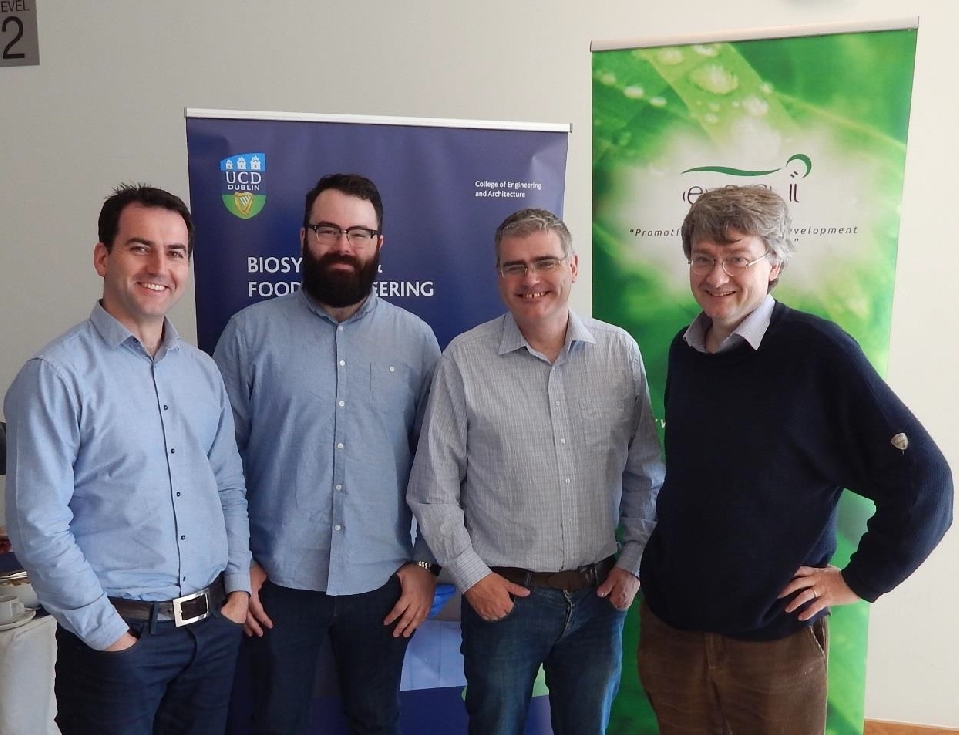
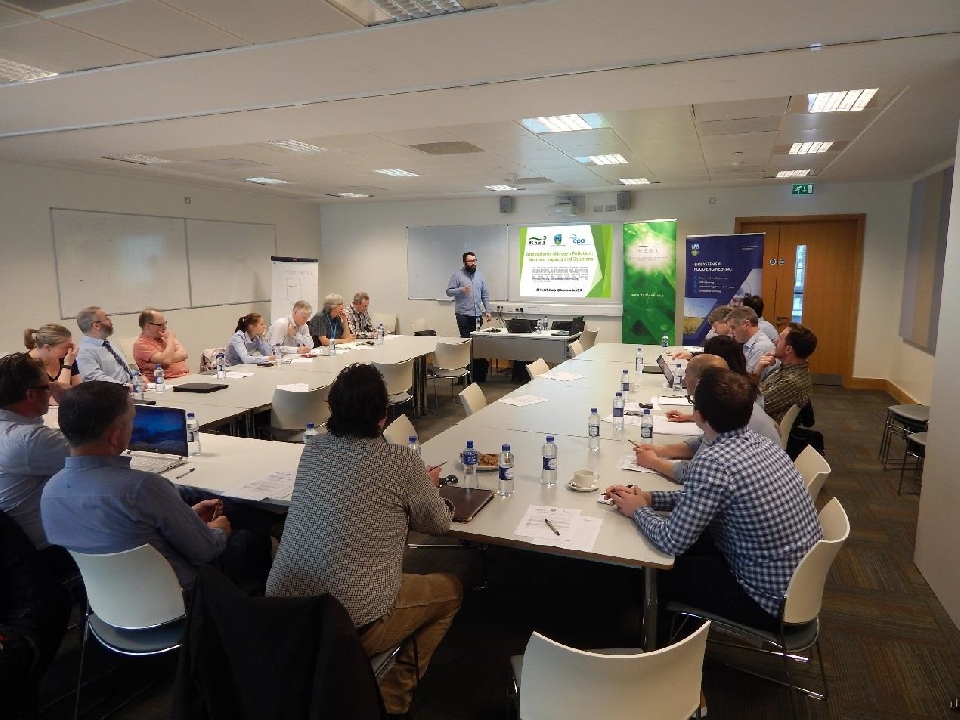
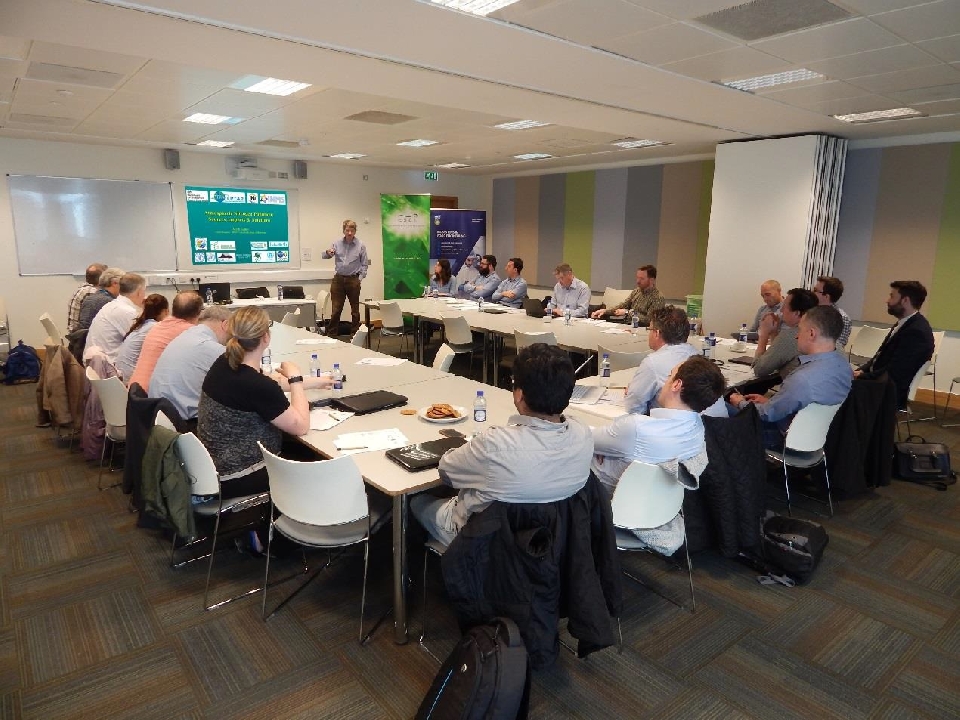
By Daithi Kelleghan, University College Dublin
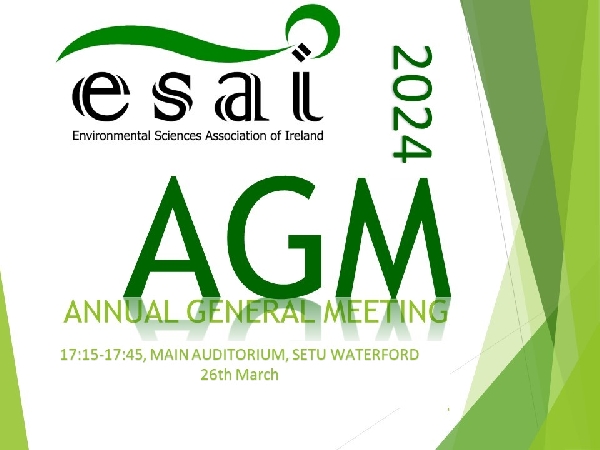
This year’s Environmental Sciences Association AGM will be held during Environ 2024 in SETU Waterford. All are welcome. Date:...
Read More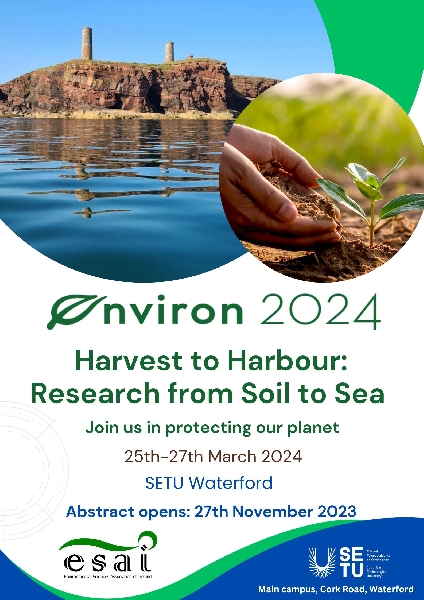
ENVRION 2024: 34th Irish Environmental Researchers Colloquium 25th-27th March 2024, in conjunction with South East Technological University, Waterford....
Read More